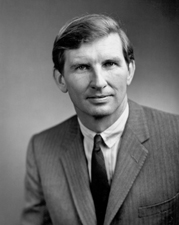
Back چوزيف تيدينجس ARZ جوزف دی. تایدینقز AZB Joseph Tydings German جوزف دی. تایدینگز Persian Joseph D. Tydings Hungarian Joseph Tydings Polish Joseph Tydings SIMPLE Joseph Tydings Swedish Joseph Tydings Turkish
Joseph Tydings | |
|---|---|
 | |
| United States Senator from Maryland | |
| In office January 3, 1965 – January 3, 1971 | |
| Preceded by | J. Glenn Beall |
| Succeeded by | J. Glenn Beall Jr. |
| United States Attorney for the District of Maryland | |
| In office 1961 – November 21, 1963 | |
| Preceded by | Leon H. A. Pierson |
| Succeeded by | Robert H. Kernon |
| Member of the Maryland House of Delegates from the Harford County district | |
| In office 1955–1961 | |
| Succeeded by | W. Lester Davis |
| Personal details | |
| Born | Joseph Davies Cheesborough[1] May 4, 1928 Asheville, North Carolina, U.S. |
| Died | October 8, 2018 (aged 90) Washington, D.C., U.S. |
| Political party | Democratic |
| Spouse(s) |
Virginia Reynolds Campbell
(m. 1955; div. 1974) |
| Relations | Millard Tydings (stepfather) |
| Children | 5, including Alexandra |
| Alma mater | University of Maryland, College Park University of Maryland School of Law |
| Military service | |
| Branch/service | United States Army |
| Years of service | 1946-1948 |
| Rank | Corporal |
| Unit | 6th Constabulary Regiment |
| Battles/wars | Occupation of Germany |
Joseph Davies Tydings (né Cheesborough; May 4, 1928 – October 8, 2018) was an American lawyer and politician from Maryland. A member of the Democratic Party, he was most notable for his service as a member of the United States Senate for only a single term from 1965 to 1971.
Born in North Carolina, Tydings moved to Maryland as a youth after he was adopted by his mother's husband, Millard Tydings, who also served as a U.S. Senator from Maryland. After serving in the military, he obtained his law degree and entered into practice. He served in the Maryland House of Delegates from 1955 to 1961, and as United States Attorney for Maryland from 1961 until his resignation in 1963 to run for Senate.
Tydings easily won election to the Senate in 1964. However, his controversial stances on gun control and crime in the Washington, D.C. area cost him re-election in 1970. He made another attempt at his old seat in 1976, but was defeated in the Democratic primary election by Paul Sarbanes, who was a member of the United States House of Representatives. He later served as a member of the Board of Regents of the University of Maryland, College Park and the University System of Maryland, and continued to practice law.[2]
Tydings also argued Eisenstadt v. Baird, in which the Supreme Court of the United States legalized birth control for single persons in 1972, something that had been prohibited in many states. The decision has been described as among the most influential Supreme Court decisions of the 20th century.[3]
- ^ "Joseph Davies Cheesborough - North Carolina Birth Index". FamilySearch. Retrieved October 9, 2018.
- ^ Cite error: The named reference
CongBiowas invoked but never defined (see the help page). - ^ Lucas, Roy (Fall 2003). "New Historical Insight on the Curious Case of Baird v. Eisenstadt". Roger Williams University Law Review. IX (1): 23–37. doi:10.2307/1600542. JSTOR 1600542.